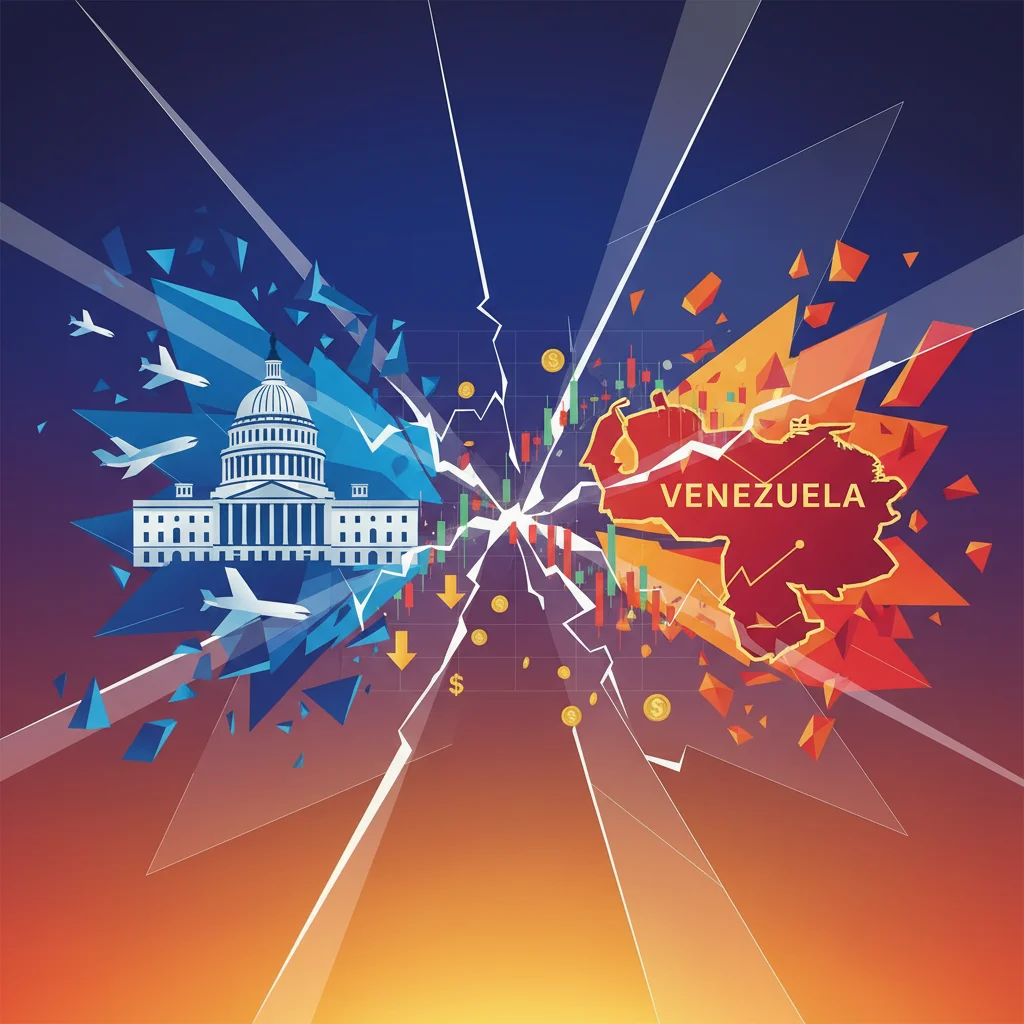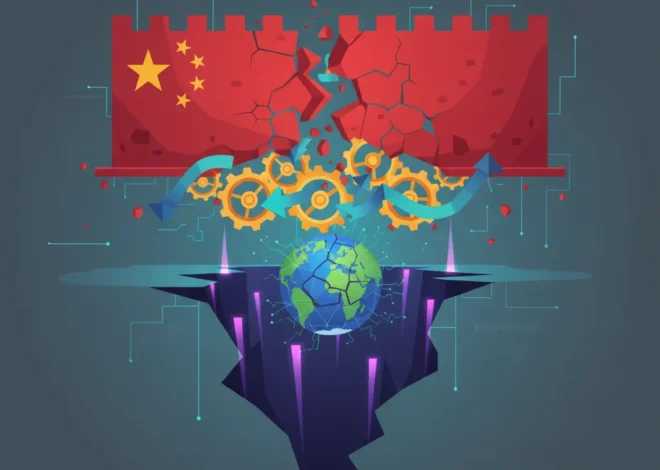
Geopolitical Tremors: What US Military Threats in Venezuela Mean for Global Markets
The global financial landscape is a complex tapestry woven from economic data, corporate earnings, and investor sentiment. But every so often, a thread of geopolitical tension is pulled, and the entire fabric risks unraveling. Recent reports that the White House is not only authorizing covert CIA operations but also actively considering military strikes on Venezuelan soil represent just such a moment. According to an exclusive from the Financial Times, this dramatic escalation in US posture towards the beleaguered South American nation signals a potential flashpoint with profound implications for the global economy, energy markets, and investment portfolios.
For investors, business leaders, and finance professionals, dismissing this as a distant political squabble would be a grave miscalculation. The potential for conflict in a nation sitting atop the world’s largest proven oil reserves is a significant variable that can trigger volatility across asset classes, from commodities and equities to currencies and bonds. Understanding the context, the potential scenarios, and the economic fallout is no longer optional—it’s essential for prudent risk management and strategic investing.
The Venezuelan Cauldron: A Nation on the Brink
To grasp the gravity of the current situation, one must first understand the depth of Venezuela’s collapse. Once one of Latin America’s most prosperous nations, the country has been ravaged by years of economic mismanagement, political turmoil, and authoritarian rule under Nicolás Maduro. The consequences have been catastrophic.
The nation’s economy has been in a freefall for the better part of a decade. The International Monetary Fund (IMF) has documented a staggering economic contraction, with hyperinflation reaching levels that have rendered the national currency, the bolívar, virtually worthless. This has precipitated a humanitarian crisis of epic proportions, with millions fleeing the country and those remaining facing severe shortages of food, medicine, and basic necessities. According to the World Bank, Venezuela’s real GDP is estimated to have contracted by more than 75% between 2014 and 2021, one of the largest economic collapses outside of wartime in modern history.
At the heart of this turmoil lies Venezuela’s immense oil wealth. The country holds an estimated 303 billion barrels of proven oil reserves, more than any other nation on Earth. Yet, due to chronic underinvestment, corruption, and crippling U.S. sanctions, its production has plummeted. Data from the U.S. Energy Information Administration (EIA) shows that crude oil production has fallen from over 2.3 million barrels per day in 2016 to a fraction of that level today (source). This collapse of its primary economic engine has crippled the government’s ability to function and fueled the ongoing crisis.
Anatomy of a Bull Run: Deconstructing Bitcoin's Record-Breaking Surge
Decoding the White House’s Calculus: Oil, Influence, and Regional Stability
The threat of U.S. military intervention is the culmination of a long-standing policy of “maximum pressure” aimed at ousting the Maduro regime. This policy has primarily relied on economic sanctions targeting the state-owned oil company, PDVSA, and key figures in the government, effectively cutting Venezuela off from the global banking system.
The authorization of covert operations and the consideration of strikes represent a significant escalation. The strategic motivations are multifaceted:
- Energy Security: While the U.S. is a net energy exporter, global oil prices are highly sensitive to supply disruptions. Further destabilization in Venezuela could remove more of its oil from the market or, conversely, a U.S.-backed regime change could eventually bring its vast reserves back online, fundamentally altering the global energy landscape.
- Countering Foreign Influence: Venezuela has become a key foothold in Latin America for U.S. adversaries, notably Russia and China. Both nations have extended billions of dollars in loans-for-oil deals, gaining significant economic and political leverage. U.S. action can be seen as a move to counter this influence in its traditional sphere of influence.
- Regional Stability: The Venezuelan refugee crisis is placing an immense strain on neighboring countries like Colombia and Brazil, threatening regional stability. The White House may view decisive action as necessary to prevent a wider regional meltdown.
The table below outlines potential U.S. actions and their likely first-order impacts on key financial markets, providing a framework for assessing the escalating risk.
| Potential U.S. Scenario | Impact on Oil Prices (WTI/Brent) | Impact on LatAm Equities (EEM) | Impact on U.S. Stock Market (S&P 500) |
|---|---|---|---|
| Status Quo (Sanctions Only) | Neutral to Slightly Bullish (Supply remains constrained) | Negative (Continued regional uncertainty) | Neutral (Priced in by the market) |
| Increased Covert Operations | Moderately Bullish (Increased risk premium) | Negative (Heightened instability fears) | Slightly Negative (Geopolitical jitters) |
| Limited Military Strikes | Highly Bullish (Significant supply disruption fears) | Highly Negative (Flight to safety, regional conflict risk) | Negative (Inflation fears, risk-off sentiment) |
| Successful Regime Change | Long-term Bearish (Potential for massive supply increase) | Positive (Reduced regional risk, investment opportunities) | Positive (Lower energy prices, reduced uncertainty) |
The Ripple Effect: From Caracas to Wall Street
A military conflict in Venezuela, no matter how limited, would send immediate shockwaves through the global financial system. The most direct impact would be on the oil market. A sudden halt in Venezuela’s remaining exports, coupled with the risk of damage to its oil infrastructure, would send crude prices soaring. This would fuel inflationary pressures globally, complicating the work of central banks and potentially forcing them into more aggressive monetary tightening, which could, in turn, put a damper on the stock market.
For those involved in international trading and finance, the secondary effects are just as concerning. A conflict would trigger a classic “risk-off” event, with capital flowing out of emerging markets—particularly in Latin America—and into safe-haven assets like U.S. Treasuries, the Japanese Yen, and gold. The risk premium for any company with exposure to the region would spike, and supply chains could be severely disrupted.
Furthermore, the involvement of Russia and China cannot be understated. Both have significant financial stakes in Venezuela and would likely view U.S. military action as a direct threat to their interests. Their response, whether diplomatic, economic, or military, would add another layer of complexity and risk, potentially escalating the situation into a broader great-power confrontation with far more severe economic consequences. A report from the Council on Foreign Relations highlights the deep financial ties, noting that China alone has loaned Venezuela over $50 billion in the past decade, often to be repaid with oil shipments (source).
Static on the Line: Navigating the UK Telecoms Shake-Up and Its High-Stakes Financial Fallout
The New Frontier of Financial Warfare
Beyond the immediate market impact, the Venezuelan situation underscores a profound shift in modern geopolitics. Conflicts are increasingly being fought not on traditional battlefields, but through the arteries of the global financial system. The use of sanctions, asset freezes, and exclusion from international payment systems has become the primary tool of statecraft for the United States.
This reliance on economic warfare is forcing nations to explore alternatives to the dollar-dominated system. It is accelerating research and development in central bank digital currencies (CBDCs) and creating a permissive environment for non-state actors to leverage fintech and blockchain technology. While Venezuela’s own attempt with the “Petro” cryptocurrency was largely a failure, it was a clear signal of intent. The desire to build a parallel financial ecosystem, resistant to U.S. sanctions, is a powerful motivator that will shape the future of financial technology and international economics.
Shell's Stock Surge: A Deep Dive into the Q4 Update Fueling Investor Optimism
Conclusion: A High-Stakes Game for the Global Economy
The news that the U.S. is considering military action in Venezuela is a stark reminder that geopolitical risk is a potent and unpredictable force in the financial markets. It is a complex situation with no easy outcomes. For investors and business leaders, the key is not to predict the future, but to prepare for the range of possibilities. This means diversifying portfolios, hedging against oil price volatility, and carefully assessing any exposure to the Latin American region.
Ultimately, the crisis in Venezuela is a microcosm of the larger forces shaping our world: the tension between established and rising powers, the weaponization of the global economy, and the relentless search for energy resources. The tremors from this small South American nation have the potential to be felt on trading floors and in boardrooms around the world. Watching Caracas has become essential for anyone serious about understanding the risks and opportunities in the global market today.


